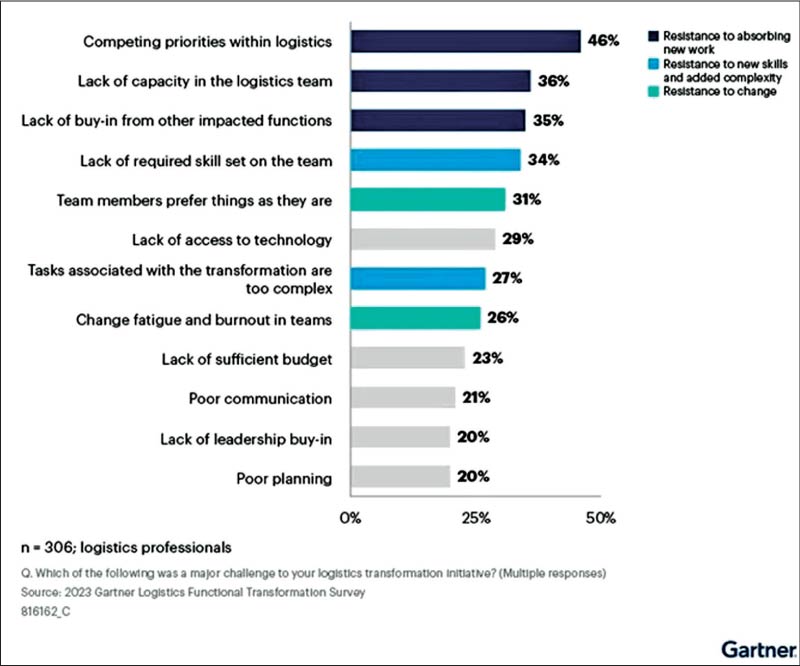Thursday Feb 19, 2026
Thursday Feb 19, 2026
Friday, 16 August 2024 13:15 - - {{hitsCtrl.values.hits}}

Consulting giant Gartner finds 76% of attempted logistics transformations never fully succeed, failing to meet critical budget, timeline or KPI metrics
Logistics leaders based around the world are regularly launching new transformation initiatives in a bid to cut costs and enhance efficiency.
But, according to the results of a new survey carried out by Gartner, a significant majority (76%) of these attempted transformations never fully succeed, failing to meet critical budget, timeline or KPI metrics.
There is hope, however, for executives and other decision-makers. The findings also show that effectively responding to team resistance and incorporating feedback dramatically increased the odds of transformation success.
“Leaders often respond to resistance by ramping up urgency and adopting a directive leadership style, which is not only ineffective, but actually counterproductive,” comments Senior Principal Researcher in Gartner’s Supply Chain practice Snigdha Dewal.
“Instead, leaders should engage their teams from the start of the process, embrace the areas of resistance as a resource, not a problem and act on feedback to adapt transformation plans and how they are implemented. Harvesting the collective wisdom of their teams can lead to dramatically improved odds of success.”
Internal change resistance obstructs transformation
In carrying out their global survey, researchers from Gartner gathered the thoughts of 306 logistics professionals from organisations with US$500 million or more in enterprise-wide annual revenues.
The study discovered that more than 80% of respondents had attempted four transformations in fewer than five years, averaging almost one a year. Internal change resistance was found to play a greater role in obstructing the success of their transformation initiatives when compared to outside pressures.
A similar proportion (81%) of logistics leaders believe transformation is critical, yet only one in five adopted the approach of using resistance as a resource to leverage the collective wisdom of their teams to improve transformation outcomes.
Adopting this less common approach improved the odds of transformation success by 62%.
The prevailing ‘urgency approach’, characterised by directive leadership, limited stakeholder engagement and a ‘get with the programme’ mindset, led to a 47% decrease in the odds of transformation success.
Gartner’s calculation of transformation success was determined from regression analysis of actions and the messaging adopted by organisations towards their teams during logistics transformations, in addition to subsequent impact on success metrics.
Leaders must leverage resistance
Snigdha’s take is that, while resistance to transformation can be either productive or unproductive, leaders must shift from viewing resistance as a barrier to seeing it as a source of valuable insights – learning how to leverage it.
“This approach not only enhances project management outcomes, but also boosts staff morale and can help unearth new competitive advantages,” she adds.
Three key drivers behind this leadership approach include:
Demonstrate listening: Leadership figures recognise objectives, but remain open-minded to changes or evolutions based on lessons learned during the process
Involve resistant stakeholders: Leaders collaborate with the most resistant team members to better understand hurdles or interpret the broader team’s change appetite
Maintain an adaptable mindset: Acknowledging that transformations have many setbacks, leadership teams often focus on mission-critical aspects. Failure can be viewed as an indicator of where not to focus efforts.
